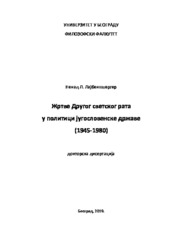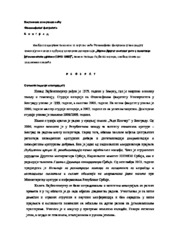Приказ основних података о дисертацији
Жртве Другог светског рата у политици југословенске државе : (1945-1980)
Victims of Second World War in the politics of the Yugoslav state :(1945-1980)
| dc.contributor.advisor | Димић, Љубодраг | |
| dc.contributor.other | Dimić, Ljubodrag | |
| dc.contributor.other | Радојевић, Мира | |
| dc.contributor.other | Radojević, Mira | |
| dc.contributor.other | Животић, Александар | |
| dc.creator | Лајбеншпергер, Ненад | |
| dc.date.accessioned | 2019-07-31T14:32:27Z | |
| dc.date.available | 2019-07-31T14:32:27Z | |
| dc.date.available | 2020-07-03T10:07:01Z | |
| dc.date.issued | 2019-03-26 | |
| dc.identifier.uri | http://eteze.bg.ac.rs/application/showtheses?thesesId=6841 | |
| dc.identifier.uri | https://nardus.mpn.gov.rs/handle/123456789/11286 | |
| dc.identifier.uri | https://fedorabg.bg.ac.rs/fedora/get/o:19945/bdef:Content/download | |
| dc.identifier.uri | http://vbs.rs/scripts/cobiss?command=DISPLAY&base=70036&RID=530604183 | |
| dc.description.abstract | Текст докторске дисертације презентује резултате истраживања присуства жртава Другог светског рата у политичком животу Југославије од краја рата (1945), до смрти њеног председника Јосипа Броза Тита (1980). Представљен је појам „жртва рата“, приказано кога је Југославија сврставала у ту категорију и како је израчунавала њихов број. Посматра се употреба жртава у политичке сврхе, када се оне користе да би се остварили одређени политички, економски и друштвени циљеви, као што су територијално проширење земље, репарације, обештећења, суђење ратним злочинцима, подизање државног угледа, политички обрачуни са неистомишљеницима у земљи, итд. Са друге стране, прате се и процеси у којима су жртве рата биле заборављене или потиснуте, као при прихватању помоћи бугарске војске у ослобођењу земље, одрицање репарација од Бугарске, прихватање повољног економског аранжмана уместо обештећења од Савезне Републике Немачке и потреба да се братство и јединство у земљи одржавају уједначавањем злочинаца и потискивањем причања о националности жртава, односно изједначавањем свих југословенских жртава, без обзира на њихов број у оквиру једног народа и без обзира на починиоца који је долазио из редова југословенских народа. Посматрали смо и како су партија, држава и друштво радили на одржавању сећања на жртве рата и народноослободилачку борбу кроз подизање споменика, отварање музеја, стварање ликовних уметничких дела, писање уџбеника, стручне и популарне литературе и кроз снимање филмова. У раду је коришћена архивска грађа више архива, али и досадашња литература која се бавила делом истраживаних процеса, или процеса у оквиру којих се дешавало употребљавање жртава рата. Жртве рата су у социјалистичкој Југославији биле свеприсутне, али не и најважније. Партија и држава су их користиле у своје политичке сврхе, посебно у првим годинама после рата. Величање жртава кроз разне видове уметности и стваралаштва је постојало током целог истраживаног периода. Диктат државе у начину приказа рата и његових жртава био је јак у првих неколико година после рата, али је током сукоба са Информбироом ослабио, а затим скоро и нестао. Без обзира на политичке диктате и потребе, уметници и ствараоци су давали и своје виђење рата, које се понекад и косило са државним | sr |
| dc.description.abstract | Doctoral dissertation presents results of research of victims of Second World War in political life of Yugoslavia from the end of the war (1945) until the death of its president Josip Broz Tito (1980). The term “victim of war” is presented, along with the explanation of who was victim of war for Yugoslav authorities, and how was the number of victims counted. The use of victims in political purposes is observed – when they are used to gain some political, economic or social goal, like territorial expansion of the country, reparations, compensation, trials to war criminals, raising state reputation, political clashes with opponents in the country, etc. On the other hand, forgetting of the victims of war or their suppressing, is also followed – like when Yugoslavia accepts Bulgarian help in liberation of the country, renunciate reparations from Bulgaria and accepts favorable economic agreement instead of compensation for the victims of war, from Federal Republic of Germany. Victims were also suppressed because of a need to maintain brotherhood and unity. It was done through unification of the villains and suppression of talks about the nationality of the victims, i.e. equalization of all Yugoslav victims, no matter to their number in corpus of one Yugoslav nation, and no matter to the perpetrator which were also from one of Yugoslav nations. We have also observed how did the party, state and society, worked on the keeping of the memory on the victims of war and People Liberation War through the erecting of monuments, opening of the museums, creating the art works, writing of school textbooks, professional, scholar and popular literature, and through making of movies. Work is based on archival materials from several Archives and on the existing literature which deals with our topic, or shows broader picture. Victims of war were omnipresent in socialist Yugoslavia, but they were not the most important thing. Party and the state used them in political purposes, especially in first years after the War. Praising of the victims through different forms of art and creativity existed during the whole researched period. In the first after war years state strongly dictated the way in which the War and its victims will be presented. After the clash with the Informbiro, that dictation weakened, and soon after it almost disappeared. Artists and writers presented their own view of the War, no matter to political dictations and needs. Sometimes, they were opposite one to another | en |
| dc.format | application/pdf | |
| dc.language | sr | |
| dc.publisher | Универзитет у Београду, Филозофски факултет | sr |
| dc.rights | openAccess | en |
| dc.rights.uri | https://creativecommons.org/licenses/by-nc-sa/4.0/ | |
| dc.source | Универзитет у Београду | sr |
| dc.subject | жртве рата | sr |
| dc.subject | victims of war | en |
| dc.subject | Yugoslavia | en |
| dc.subject | political use | en |
| dc.subject | memory | en |
| dc.subject | war criminals | en |
| dc.subject | reparations | en |
| dc.subject | compensation | en |
| dc.subject | brotherhood and unity | en |
| dc.subject | Југославија | sr |
| dc.subject | политичка употреба | sr |
| dc.subject | сећање | sr |
| dc.subject | ратни злочинци | sr |
| dc.subject | репарације | sr |
| dc.subject | обештећење | sr |
| dc.subject | братство и јединство | sr |
| dc.title | Жртве Другог светског рата у политици југословенске државе : (1945-1980) | sr |
| dc.title.alternative | Victims of Second World War in the politics of the Yugoslav state :(1945-1980) | en |
| dc.type | doctoralThesis | en |
| dc.rights.license | BY-NC-SA | |
| dc.identifier.fulltext | http://nardus.mpn.gov.rs/bitstream/id/28203/Disertacija.pdf | |
| dc.identifier.fulltext | http://nardus.mpn.gov.rs/bitstream/id/28204/IzvestajKomisije20721.pdf | |
| dc.identifier.fulltext | https://nardus.mpn.gov.rs/bitstream/id/28204/IzvestajKomisije20721.pdf | |
| dc.identifier.fulltext | https://nardus.mpn.gov.rs/bitstream/id/28203/Disertacija.pdf | |
| dc.identifier.rcub | https://hdl.handle.net/21.15107/rcub_nardus_11286 |



